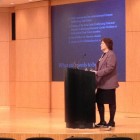
Teaching the Teachers How to Fight Sex Trafficking
|
Teachers can be the first line of defense against child sex trafficking, according to Maria Velikonja, a former FBI agent who has worked on human trafficking issues for the United Nations. During a two-day conference on sex trafficking at Georgia State University, in Atlanta, Velikonja spoke about the warning signs educators should watch for in their students and what teachers can do to keep their students safe. The conference, Not in Georgia: Combating Human Sex Trafficking, organized by the Georgia Department of Education, was the third part of an ongoing series of lectures on the sex trade. In a lecture titled, “Combating Human Sex Trafficking in Georgia: What Public School Educators Can Do,” Velikonja began by outlining some of the basics of sex trafficking for teachers. “What does a potential sex trafficking victim look like?” she asked the small crowd.


